My father was an accountant and yet we hardly talked about money in a way that was calm, rational, or made any sense to me. I remember my mother—overworked from raising us, keeping the house together, taking care of my father, and working a full-time job—hunched over the checkbook in the dining room while she paid the bills. Sometimes when she was fighting with my father, she’d say, “Let’s go to the mall,” and we’d spend money. Later when my parents got divorced, I saw how money can divide a family even further.
I’ve always been interested in who has money and who doesn’t. And like most women, people of color, artists, teachers, parents, queer, and trans people I know, I never have enough money. I have student loans, I live in an expensive city, I make half of what my tenured colleagues make, I’m a single mom, and I work a couple of different jobs. I’m not special that way, and I’m lucky enough to have health insurance when so many Americans don’t. It’s called the gig economy.
When I first visited Occupy Wall Street, I was amazed at the world the protesters created and their focus on debt and Wall Street accountability. They shifted the narrative about debt in this country and they moved it out of shame and into the light. A couple of years later, when I began to work on my debut novel The Not Wives, I knew that Occupy, gentrification, and strong, sex-positive women in financial precarity would be at the heart of the book. Because those are the women I know and love, and the world so many of us live in right now in Trump’s America.
What gets us through late capitalism and gigging? Friends, lovers, family, art, activism, dancing, and for me, books! Here are just a few of my favorites.
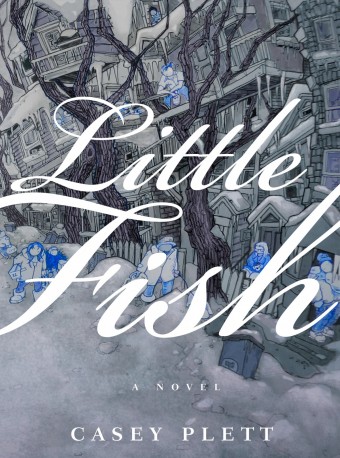
Little Fish by Casey Plett
If you believe that sex work is work, then you’ll be happy to know that there are a couple of books I’ve loved in the last couple of years that treat it as just another gig with ups and downs, bad days and good days. Little Fish by Casey Plett won the 2018 LAMMY for best Transgender Fiction and tells the story of Wendy Reimer, a trans woman living in Winnipeg, Canada. After the death of her Oma, Wendy receives a phone call from a distant family friend, who tells her that her Opa might have been transgender too. I loved this book for many reasons—its frank treatment of sex and dating for a trans woman, the closeness that Wendy has with her father, the tight friendships between trans women both queer and straight, and the loving and truthful way Plett deals with suicide, family, and religion. When Wendy loses her job at a gift shop, she returns to sex work because it pays well and allows her to make her own schedule. It’s not a harrowing plot point or a failure. As Plett writes, “She felt okay about where her life was headed.” I savored this book and I was sad when it was over because I’d grown attached to Wendy and her friends.

Sketchtasy by Mattilda Bernstein Sycamore
Sketchtasy was also nominated for a LAMMY for transgender fiction (we need more awards for trans writers!). The novel takes us back to homophobic Boston in the mid-90s when queer desire and HIV status were inextricably linked. Written in roving, ecstatic, runaway prose, Bernstein Sycamore conjures up Alexa—a smart queen who has been through some tough shit. This book captures life on a dime, sex work, sexual abuse, trauma, clubbing, and drugs with such honesty and insight that I wanted to get dressed up in my Salvation Army green pleather skirt and go back. Nobody writes like Bernstein Sycamore. I am especially in awe of her dialogue and voice, and the book’s fearless fuck you to capitalism, homophobia, and gentrification.
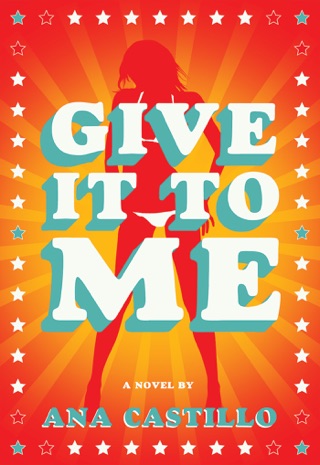
Give It To Me by Ana Castillo
I laughed a lot when I read Give It To Me by Ana Castillo and I’ve really never read another book like it. Our protagonist is Palma Piedras, a bisexual 43-year-old divorced Latina who tries to find her parents, while rekindling a love affair with her cousin who just got out of jail, and working as a translator and Hollywood extra to pay the bills. There are too few books with sex-positive bi/pan women at the center, and I was delighted to follow Palma through hook-ups, revenge sex, and lovers who aren’t always what they seem. The book is tender too, as Palma remembers her childhood with her difficult abuela and lazy uncle, reunites with her family, and grapples with the freedom and solitude of middle-age. Palma’s cheeky asides, mix of Spanish and English, and her love for trouble make this an unforgettable book about scraping by as your complicated, wounded self. This book, and Palma too, are 100% hustle.

Severance by Ling Ma
Speaking of hustle, there is no protagonist willing to work as hard as Candance Chen, a millennial office drone who specializes in Bible sales in the riveting, scary, and unputdownable novel about the end of the world. Set in a New York City decimated by Shen Fever, Candance eventually leaves the city and winds up in a survivalist religious cult run by a sad man that some of us have definitely dated. Sure there are uncanny, scary zombies in this book, but at its core Severance is a book about grief, loss, and the rituals we’re made to enact in order to survive. Ma’s ability to craft a believable deserted New York, left with only a few workers and armed guards is deft and terrifying.
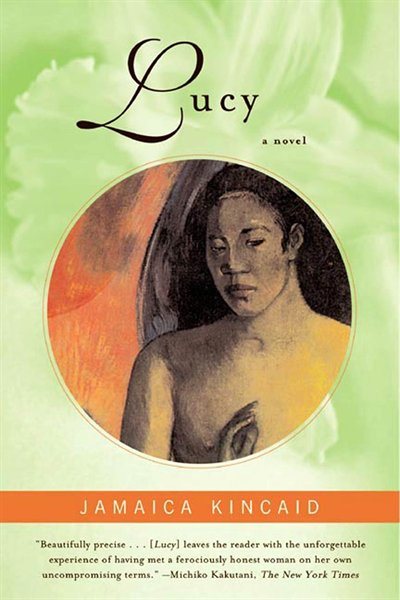
Lucy by Jamaica Kincaid
If you can’t do futuristic zombies, why not babies—another dank engine of the gig economy since we don’t yet have universal daycare in this country? I love everything Jamaica Kincaid has ever written, but Lucy is my favorite. Kincaid published this slim gem in 1990 New York and it’s a thrilling groundbreaker about a young immigrant from the West Indies who becomes a live-in au pair for a wealthy white couple and their four perfect children. When I first moved to NYC, I babysat to survive, and briefly I was a nanny for a family not unlike the one Kincaid describes. Eventually, I ran away too. Kincaid writes with fierce honesty, disdain, love, and wit about the stupidity of white people, sexual longing, art-making, and loss. I reread the book in just three hours. It’s perfect.
Sleeping on Jupiter by Anuradha Roy
If you have a heart, this book will break it. The novel is told from the perspective of multiple characters who converge in the seaside town of Jarmuli, India including a documentary filmmaker, three women in their 60s on vacation, and a temple guide. Roy explores sexual abuse, queer love, parenting, adoption, trauma, religion, and migration with care. I’ve read this book three times, and each time I find something new to admire. Roy’s craft is like no other, and she’s able to get so much feeling and action into one town. It’s easy to see why Roy is considered an activist and a novelist because she links these parts of herself fearlessly in all of her books. I was especially moved by Bodah’s daily grind as a temple guide and the young boy he falls in love with, Raghu. Johnny Toppo, the seaside coffee and chai vendor, is another unforgettable character in literature—traumatized, forever working and singing, and full of secrets.

Landscape with Sex and Violence by Lynn Melnick
One of the best poetry collections I’ve read in a long while! Melnick writes into vivid neon life, a late 80s world of Hollywood California, sex work, rape, teenage freedom, Courtney Love’s band Hole, part-time jobs at video stores, and panhandling on the Sunset Strip—all amidst the lush greenery of California. Written with humor, honesty, and a fuck-you aesthetic that we need more than ever in this time of Jeffrey Epstein and Larry Nasser. Melnick’s book kicks the patriarchy’s ass while also staying tender and true to girls and women. In one of my favorite poems in the collection, Melnick writes, “Lynn! they lied to you/don’t you know?/Your womb will be the first thing to heal./What you smell is pleasure, not the rot of the thing/amid the waste/You will have babies./You will write poems about flowers that turn on in darkness.”

Psychopomps by Alex DiFrancesco
This collection of personal essays by the unflinchingly honest and deeply reflective DiFrancesco, had me from the beginning. DiFrancesco writes about New York City, dating while trans, their girlfriend leaving them, their toxic family, mental illness, and trying to eke out an existence in a bookstore and as a baker in New York City and Ohio. The book is also a testament to queer history, trans families, and the kinds of friendships that happen when we’re drunk and lost. I am deeply in love with the titular essay in the collection about Vivian, a trans mom, who tries to save as many trans kids as she can, and is often righteously and understandably angry. There’s also an essay about a gay man who was murdered in the town DiFrancesco grew up in, Bobby Evans, an exploration of a trans and queer murder that asks us all to consider the stories and ghosts we’ve hidden or tried to ignore because it would be easier. his book asks us to consider some hard shit, and why shouldn’t we? Still, I read it in two hours and held it to my heart when I finished.
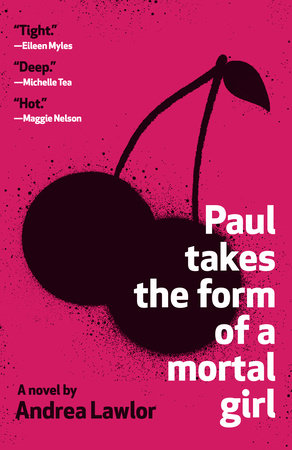
Paul Take the Form of a Mortal Girl by Andrea Lawlor
Paul Take the Form of a Mortal Girl is another dreamy novel set in the 90s. Paul has magical powers and can shapeshift into a woman with a pussy, Polly, and back again to Paul with a dick. Paul can also grow his dick and muscles to fit into queer subcultures and bars of his choosing. The fantasy of this book is joyous and as one of my trans students said when we read it in class, “I’m jealous of Paul. I want this for all trans people.” Wouldn’t it be an amazing world? No medical interventions, just joy and fucking and getting dressed and going out, and transformation when and how you want it. Paul is one of my favorite characters ever, and it’s a joy to see Lawlor play with his sexy, funny, smart mind as he travels from the Midwest to the Michigan Women’s Fair, to P-Town, and then to San Francisco. Paul is a bar back, a dishwasher, a queer bookstore clerk, and along his journey, he’s counting his money because like most of us, he’s on a tight budget. The sex in this book is hot and dirty, just like I like it.
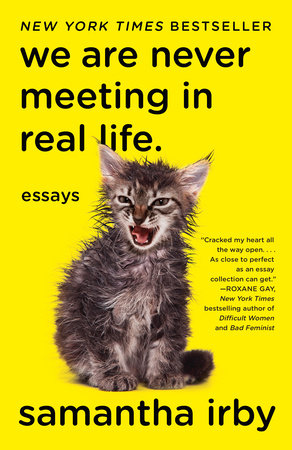
We Are Never Meeting in Real Life by Samantha Irby
This is my go-to book for anyone in a bookstore who doesn’t know what they want. I give them Samantha Irby and their lives are forever changed. I laughed really hard when I read this book. I might have peed myself, but that’s okay because this is a book that among other topics covers shitting yourself, Crohn’s Disease, being poor, learning how to eat pussy, staying fat, making rent, getting shit delivered, buying a strap on, and falling in love with a woman. With essay titles like, “You Don’t Have to Be Grateful for Sex,” “Fuck It, Bitch. Stay Fat,” and “Yo, I Need a Job,” I can’t really see what you’re waiting for. Get the book. Get all of these books.
The post 10 Books About Trying to Survive Under Late Capitalism appeared first on Electric Literature.
Source : 10 Books About Trying to Survive Under Late Capitalism










